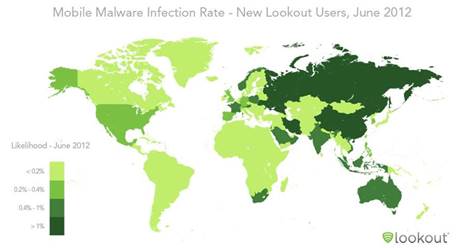Over two in five Russian Android devices are likely to be infected with malware, according to mobile security vendor Lookout.

The likelihood of a Russian Android device having malware is almost 42 percent, Lookout said in its State of Mobile Security 2012 Report.
By comparison, other countries have infection rates below one percent. Even so, Lookout estimates that as many as six million people have encountered malware on their devices in the past year.

The Android malware scene is driven by financial motivation in general and toll fraud where programs bill unsuspecting users through premium SMS services, in particular.
Lookout said that 78.5 percent of malware it detected could be classified as toll fraud programs.
Eastern Europe and Russia have lax premium SMS regulation, making them lucrative locations for toll fraud malware writers, Lookout said.
By far, the most prevalent malware is the Fakeinst family of toll fraud programs. Fakeinst is known as RuSMSMarket, OpFake, FakeBrows and FakeWAM and disguises itself as an installer for legit apps such Opera Browser or WhatsApp Messenger, Lookout said.
It is almost exclusively targeting Eastern Europe and Russian users.
Ad network hijacking or adjacking, where an attacker repackages apps with their own advertising network identifiers to steal the revenue, is another security issue, Lookout found.
Malware such as Gamex, iLegacy and Geinimi could gain root level access on devices and automatically download and rate apps, thus artificially boosting their popularity on the Android Market, earning the authors further revenue.
Man-in-the-mobile compromises that intercept two-factor authentication numbers for transactions in order to gain control over bank accounts are another source of illicit earnings for malware writers, Lookout said.
With infection rates on the rise, and no mobile platform being totally secure, Lookout said the way to stay safe is to only get apps from trusted sources.
In particular, people should be wary of apps that are typically paid-for but are offered up for free, or apps that say they're installing other apps for you.
Updating your phone, paying attention to where weblinks go when you click on them on your mobile device and also, keeping an eye on your phone bill also mitigates security issues, Lookout advised.


_(23).jpg&h=140&w=231&c=1&s=0)








 iTnews Benchmark Awards 2026
iTnews Benchmark Awards 2026
 iTnews Executive Retreat - Security Leaders Edition
iTnews Executive Retreat - Security Leaders Edition
 iTnews Cloud Covered Breakfast Summit
iTnews Cloud Covered Breakfast Summit
 The 2026 iAwards
The 2026 iAwards












_(1).jpg&h=140&w=231&c=1&s=0)



